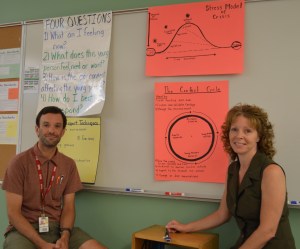FARMINGTON — Regional School Unit 9 special education teachers Patti Belanger and Eric Nichols trained 60 staff members this summer to identify children who need crisis intervention and prevent them from getting out of control.
The two trainers were educated in therapeutic crisis intervention, a system developed by Cornell University in Maryland.
RSU 9 staff, from principals to library educational technicians, were trained to identify early stages of a crisis and how to keep it from escalating. They were also taught to develop strategies to prevent and manage acute crises.
“It is all about safety,” Belanger said during an interview with the teachers last month. “Safety is paramount.”
A lot of students are coming into school with existing trauma, Nichols said. “They lack self-regulation. They lack any sort of social awareness. So they are in crisis a lot,” he said.
Therapeutic crisis intervention is a system to communicate, support and teach students that they have the appropriate skills to deal with a crisis in an appropriate manner, he said.
“For some of our kids, safety is the utmost concern,” he said.
All behavior has meaning, Belanger said.
Therapeutic crisis intervention “gives staff the ability to respond effectively to our students as well as promote growth for students to learn appropriate ways to deal with feelings,” she said.
Intervention strategies have been in the district for at least four years.
New staff members are trained in the district, instead of the district paying for them to be trained in another district. Staff members need refresher training every six months.
“It is a system that helps prevent crisis, helps prevent kids from being in crisis and helps de-escalate potential crisis rather than using physical intervention,” Nichols said.
The two are passionate about the system and training staff in it.
“Our goal is to get all staff trained, speaking the same language, using the same strategies,” Belanger said.
The strategies are used for any student who may be on the verge of going into crisis or is already in one.
“It’s our job as teachers to support and teach our students to be successful,” she said.
“And foster independence and use these skills independently in the community,” Nichols said.
The goal is to intervene before an outburst and identify feelings to the behavior and connect that feeling to the behavior, he said.

Comments are no longer available on this story